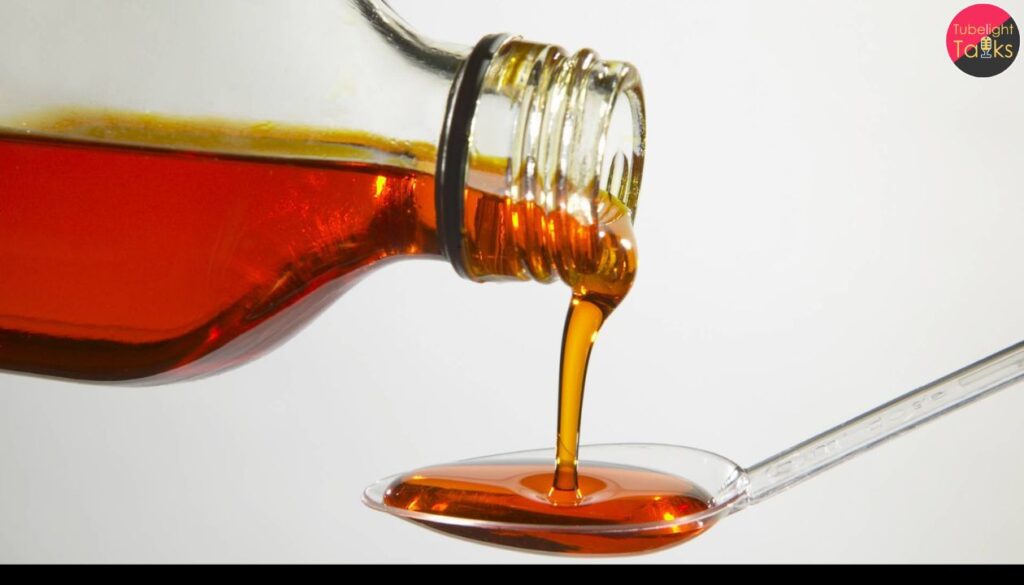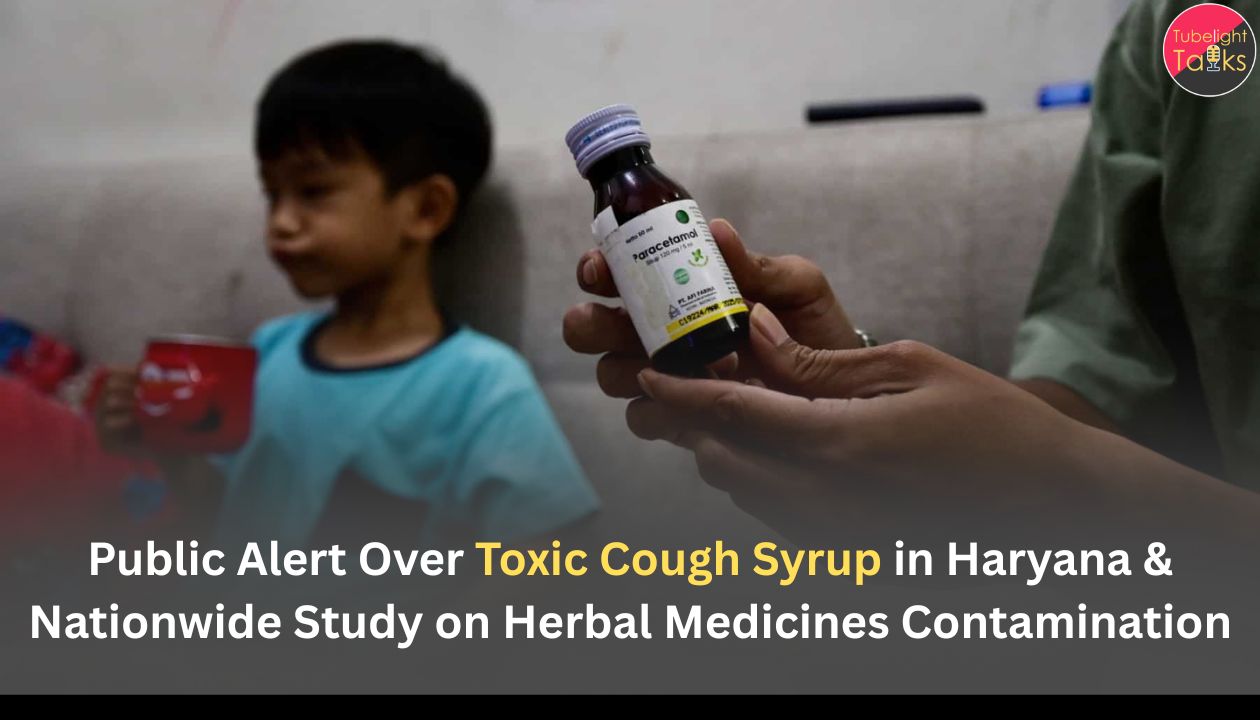Public Alert Over Toxic Cough Syrup in Haryana & Nationwide Study on Herbal Medicines Contamination
Public Alert Over Toxic Cough Syrup: In a dual health‑safety development, the state of Haryana has issued a public alert after the discovery of the industrial chemical Diethylene glycol (DEG) in a cough syrup, and the central government has announced a nationwide study to check for microbial contamination in herbal/Ayush medicines. These alerts raise concerns about pharmaceutical quality and consumer safety in India.
Haryana’s Alert — Toxic Cough Syrup Detected
What Happened
The Haryana Food and Drugs Administration (FDA) announced that the cough syrup Planokuf D, containing cetirizine hydrochloride, phenylephrine hydrochloride and dextromethorphan hydrobromide, manufactured by Shreya Lifesciences Pvt. Ltd., has been found to contain diethylene glycol impurity above permissible limits. The affected batch number is R25053101, manufactured in February 2025 and expiring January 2027.
As a result, the FDA has banned sale, distribution, prescription or use of this formulation in the state and directed all drug‑control officers to seize any stocks and maintain strict vigilance.
Why It Matters
- DEG is an industrial solvent; ingestion can cause acute kidney injury, neurological disorders and death, especially in children.
- This incident links to a broader national safety alert: the World Health Organization (WHO) has issued an alert over three Indian‑made cough syrups with DEG contamination.
- For consumers: Any cough syrup packaged locally should be checked for batch, approval, and symptom monitoring in children.
Government Action Steps
- Haryana FDA has directed drug‑control officers to draw samples, seize stocks, and issue immediate action wherever found.
- A new digital monitoring system has been established to track “high‑risk” pharmaceutical solvents in the supply chain in Haryana.
Centre’s Action — Study on Microbial Contamination in Herbal/Ayush Medicines
What’s Being Launched
The central government has announced a nationwide study to evaluate microbial contamination in herbal materials used across AYUSH systems (Ayurveda, Yoga, Naturopathy, Unani, Siddha, Homeopathy).
The study follows an August 2025 report by the Indian Council of Medical Research‑National Institute of Nutrition (ICMR‑NIN) which found major non‑compliance: 63.6 % of 110 solid herbal drug samples had aerobic bacterial counts above safe limits.

Scope & Focus
- Testing at least 10 widely‑used herbs in NABL‑accredited or AYUSH‑approved labs.
- The key pathogens under scrutiny: E. coli, Pseudomonas aeruginosa, Staphylococcus aureus, yeast and mould.
- The aim: establish microbial limits and testing standards for herbal raw drugs and formulations.
Why It Matters
- The Indian herbal/Ayush sector is rapidly growing: exports reached US $689 million in 2024‑25.
- Microbial contamination can lead to gastrointestinal illness, infections, skin conditions, especially among vulnerable populations.
- While traditional medicines are trusted globally, lack of quality control in microbial safety may affect both public health and export credibility.
Also Read: India Orders Drugmakers to Meet Global Standards After Cough Syrup Deaths
Broader Implications & Consumer Advice
Implications
- The two alerts signal that pharmaceutical safety oversight needs strengthening, both in the allopathic and traditional medicine sectors.
- Regulators may ramp up sampling, testing requirements, import/export scrutiny, and tracking of raw materials and solvents.
- Companies in both sectors may face cost increases due to tighter compliance and remediation measures.
Practical Advice for Consumers
- Always check: brand name, batch number, expiry date, and manufacturer details before use of syrups, especially for children.
- For herbal/Ayush products: choose licensed brands, check for quality certifications, and ensure storage conditions are proper.
- If you experience unusual symptoms (vomiting, abdominal pain, difficulty urinating, skin infection) after taking a medicine, seek medical attention and mention the product batch.
- Maintain medication logs for children: what was given, when, how much.
Medicine, Purity & the Inner Body
According to Sant Rampal Ji Maharaj, true health and safety aren’t just about external remedies, but also internal purity and Sat Gyaan (true spiritual knowledge). He teaches that when our external environment (medicines, food, air) is contaminated, so too can be our inner state—unless we cleanse our thoughts and actions.
“The body is a temple: if what we put inside is impure, how can the temple remain strong?”
– Sant Rampal Ji Maharaj
In this context, ensuring medicines are safe and uncontaminated becomes not only a physical duty but a spiritual one—because safeguarding life and health is part of righteous living.
Learn more:
🔗 jagatgururampalji.org
Call to Action
Protect yourself & demand better standards
What citizens can do now
- Check the legitimacy of medicines: ensure batch, expiry, manufacturer details are visible.
- Report suspected contaminated or sub‑standard medicines to local health authorities.
- Ask for prescriptions and avoid self‑medicating children (especially with cough syrups).
- Favor brands and formulations from manufacturers with transparent quality processes.
- Support standardization and regulation in herbal/Ayush medicines by staying informed and choosing trusted products.
FAQs: Cough Syrup Flagged In Haryana
Q1: Which cough syrup was flagged in Haryana?
The syrup is “Planokuf D” (batch R25053101) manufactured by Shreya Lifesciences Pvt. Ltd., and found to contain DEG above permissible limits.
Q2: What is diethylene glycol (DEG) and why is it dangerous?
DEG is an industrial‐grade solvent (used in antifreeze, brake fluid) that should not be in medicines. It can cause kidney failure, neurological damage and death when ingested.
Q3: What exactly is the Centre planning for herbal medicines?
A nationwide study to test microbial contamination (bacteria, yeast, moulds) in commonly used herbal raw materials and set safety standards.
Q4: How big is India’s herbal/Ayush medicine market?
Domestic market expected to grow to around US $200 billion by 2030; exports were about US $689 million in 2024‑25.
Q5: What signs might indicate contamination from a cough syrup?
Symptoms such as vomiting, abdominal pain, inability to pass urine, or rapid deterioration—especially in children—after using a syrup may indicate possible DEG poisoning.
This dual alert demands both immediate consumer vigilance and stronger regulatory frameworks to ensure drug and traditional medicine safety across India.











Discussion (0)